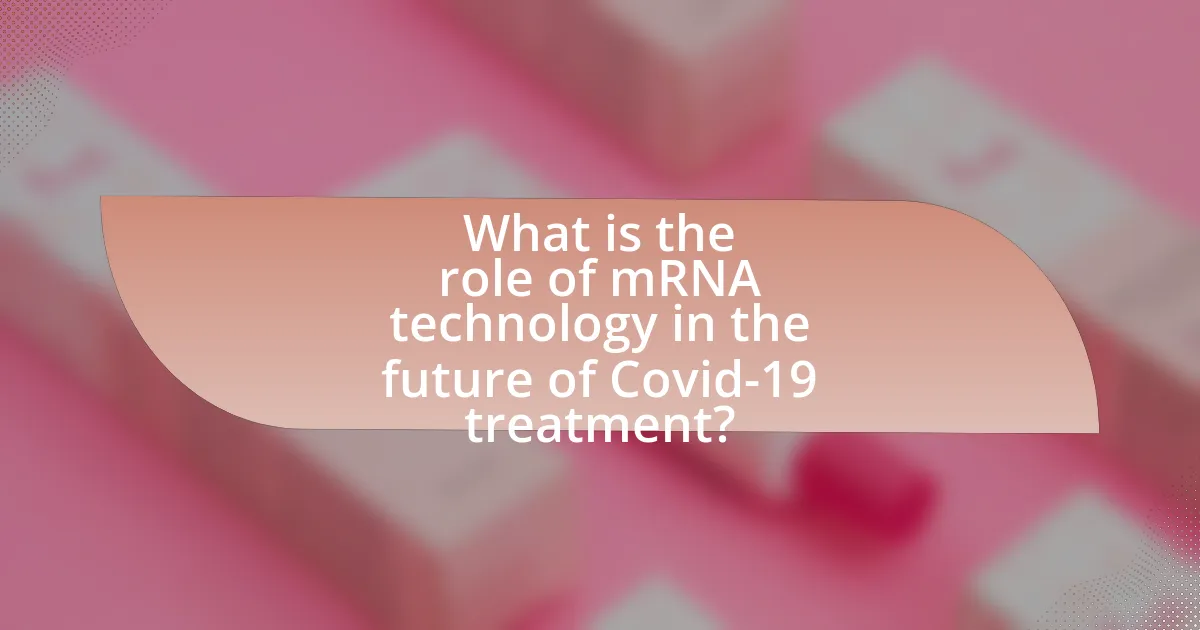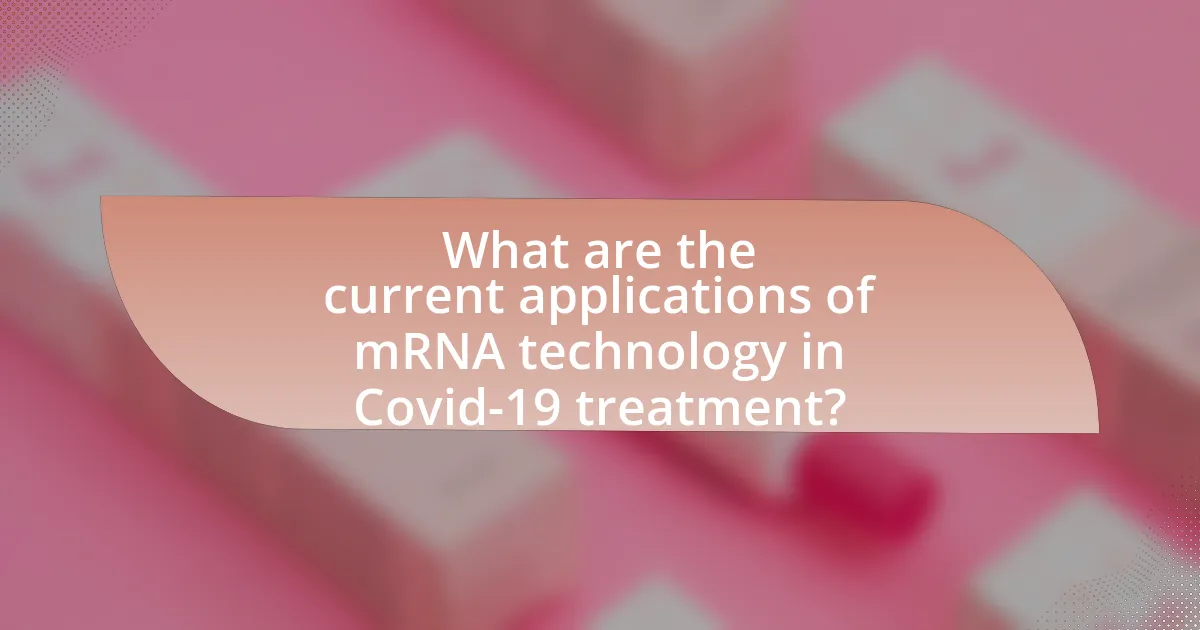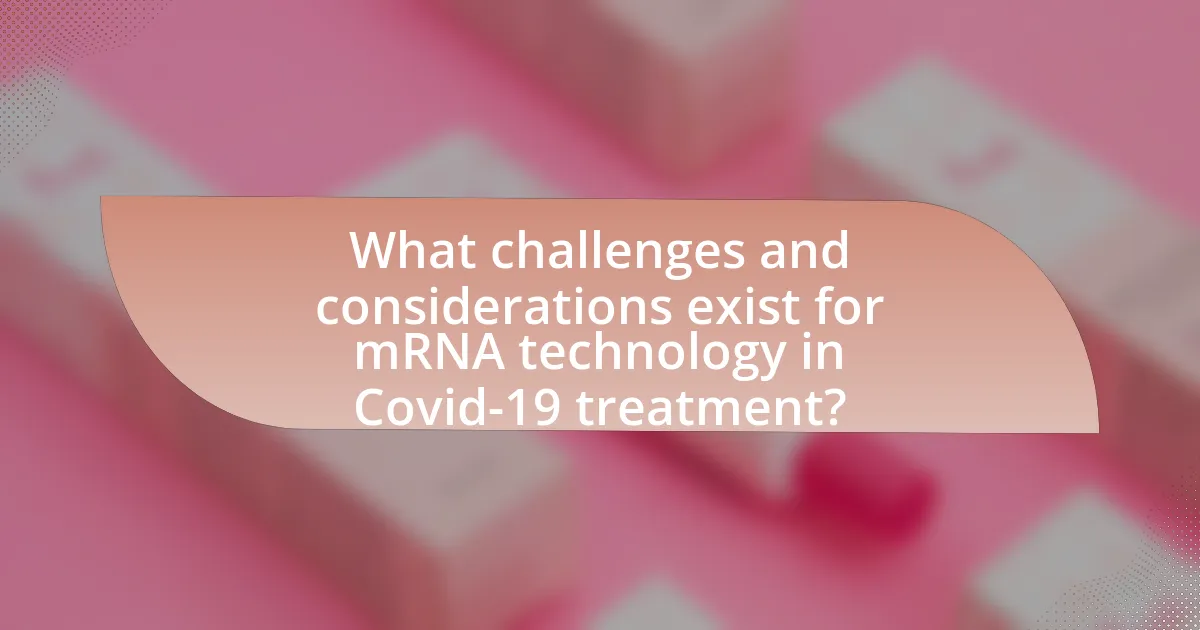The article focuses on the pivotal role of mRNA technology in the future of Covid-19 treatment, highlighting its rapid vaccine development capabilities and potential therapeutic applications. It explains how mRNA vaccines, such as those from Pfizer-BioNTech and Moderna, function by instructing cells to produce viral proteins that elicit strong immune responses. Key components of mRNA vaccines, their advantages over traditional methods, and their impact on Covid-19 infection rates are discussed. Additionally, the article explores the challenges associated with mRNA technology, including safety concerns and public perception, while emphasizing the need for ongoing research and transparent communication to enhance trust and efficacy in future applications.

What is the role of mRNA technology in the future of Covid-19 treatment?
mRNA technology plays a pivotal role in the future of Covid-19 treatment by enabling rapid vaccine development and potential therapeutic applications. This technology allows for the quick design and production of vaccines, as demonstrated by the Pfizer-BioNTech and Moderna Covid-19 vaccines, which were developed and authorized for emergency use within a year of the virus’s emergence. Studies have shown that mRNA vaccines elicit strong immune responses, providing effective protection against Covid-19 and its variants. Furthermore, ongoing research is exploring the use of mRNA technology for therapeutic interventions, such as personalized cancer vaccines and treatments for other infectious diseases, indicating its broad potential beyond Covid-19.
How does mRNA technology function in vaccine development?
mRNA technology functions in vaccine development by using synthetic messenger RNA to instruct cells to produce a harmless piece of the target virus, which then triggers an immune response. This process begins with the creation of mRNA that encodes a specific viral protein, such as the spike protein of the SARS-CoV-2 virus responsible for COVID-19. Once the mRNA is introduced into the body via a vaccine, host cells translate the mRNA into the viral protein, prompting the immune system to recognize it as foreign and generate antibodies. This method has been validated through the rapid development and deployment of mRNA vaccines, such as the Pfizer-BioNTech and Moderna COVID-19 vaccines, which have shown efficacy rates of approximately 95% in preventing symptomatic COVID-19 infection in clinical trials.
What are the key components of mRNA vaccines?
The key components of mRNA vaccines are messenger RNA (mRNA), lipids, salts, and sugars. The mRNA serves as the blueprint for producing a specific protein, typically the spike protein of the virus, which triggers an immune response. Lipids form lipid nanoparticles that encapsulate the mRNA, facilitating its delivery into human cells. Salts help maintain the stability of the vaccine formulation, while sugars act as cryoprotectants to preserve the integrity of the mRNA during storage. These components work together to ensure the vaccine’s efficacy and safety in eliciting an immune response against pathogens.
How does the immune response work with mRNA vaccines?
mRNA vaccines stimulate the immune response by introducing a piece of messenger RNA that encodes a viral protein, typically the spike protein of the SARS-CoV-2 virus. Once administered, the mRNA is taken up by cells, which then use their ribosomes to translate the mRNA into the viral protein. This protein is displayed on the cell surface, prompting the immune system to recognize it as foreign. In response, the immune system activates T cells and B cells, leading to the production of antibodies specific to the viral protein. Studies have shown that this process results in a robust immune memory, enabling the body to respond more effectively to future infections with the virus. For instance, clinical trials demonstrated that mRNA vaccines like Pfizer-BioNTech and Moderna elicited strong antibody responses and T cell activation, providing significant protection against COVID-19.
What advantages does mRNA technology provide over traditional vaccine methods?
mRNA technology offers several advantages over traditional vaccine methods, primarily in speed, efficacy, and adaptability. Unlike conventional vaccines that often use weakened or inactivated pathogens, mRNA vaccines utilize synthetic messenger RNA to instruct cells to produce a harmless piece of the virus, prompting an immune response. This approach allows for rapid development; for instance, the Pfizer-BioNTech and Moderna COVID-19 vaccines were developed and authorized for emergency use within months of the virus’s genetic sequence being published. Additionally, mRNA vaccines have shown high efficacy rates, with clinical trials indicating efficacy rates above 90% against symptomatic COVID-19. Furthermore, mRNA technology can be easily modified to address emerging variants, making it a flexible platform for future vaccine development.
Why is mRNA technology considered faster in vaccine development?
mRNA technology is considered faster in vaccine development because it allows for rapid design and production of vaccines without the need for live pathogens. This technology utilizes synthetic mRNA to instruct cells to produce a protein that triggers an immune response, enabling quicker adaptation to emerging pathogens. For instance, the Pfizer-BioNTech and Moderna COVID-19 vaccines were developed and authorized for emergency use within months of the virus’s genetic sequence being published, demonstrating the speed of mRNA platforms compared to traditional vaccine methods that often require longer timelines for cultivation and testing of live viruses.
How does mRNA technology enhance adaptability to variants?
mRNA technology enhances adaptability to variants by allowing rapid updates to vaccine formulations in response to emerging mutations. This flexibility stems from the ability to quickly synthesize new mRNA sequences that encode for the spike protein of a variant, enabling the immune system to recognize and respond to the altered virus. For instance, during the COVID-19 pandemic, mRNA vaccines like those developed by Pfizer-BioNTech and Moderna demonstrated the capability to be modified within weeks to target new variants, as evidenced by their ongoing clinical trials and updates to vaccine recommendations based on variant prevalence. This rapid adaptability is crucial for maintaining vaccine efficacy against evolving pathogens.

What are the current applications of mRNA technology in Covid-19 treatment?
Current applications of mRNA technology in Covid-19 treatment primarily include the development of mRNA vaccines, such as the Pfizer-BioNTech and Moderna vaccines, which have demonstrated high efficacy rates of approximately 95% and 94.1%, respectively, in preventing symptomatic Covid-19. These vaccines work by instructing cells to produce a harmless piece of the spike protein found on the surface of the SARS-CoV-2 virus, prompting an immune response that prepares the body to fight the virus if exposed. Additionally, mRNA technology is being explored for therapeutic applications, including the development of mRNA-based treatments aimed at enhancing immune responses in patients with Covid-19 and potential future variants.
How have mRNA vaccines impacted Covid-19 infection rates?
mRNA vaccines have significantly reduced Covid-19 infection rates. Studies indicate that these vaccines, such as Pfizer-BioNTech and Moderna, have shown efficacy rates exceeding 90% in preventing symptomatic Covid-19 infections. For instance, data from clinical trials and real-world studies demonstrate that fully vaccinated individuals have a substantially lower risk of contracting the virus compared to unvaccinated populations. Additionally, the Centers for Disease Control and Prevention (CDC) reported that mRNA vaccines have contributed to a decline in Covid-19 cases, hospitalizations, and deaths, particularly in regions with high vaccination coverage.
What data supports the effectiveness of mRNA vaccines?
mRNA vaccines, specifically the Pfizer-BioNTech and Moderna vaccines, have demonstrated high effectiveness in preventing COVID-19. Clinical trials showed that the Pfizer-BioNTech vaccine had an efficacy rate of approximately 95% in preventing symptomatic COVID-19, while the Moderna vaccine reported an efficacy of about 94.1%. Real-world studies further corroborate these findings; for instance, a study published in the New England Journal of Medicine indicated that the Pfizer-BioNTech vaccine was 88% effective against symptomatic disease and 96% effective against severe disease after two doses. Additionally, data from the CDC revealed that mRNA vaccines significantly reduced the risk of hospitalization and death among vaccinated individuals compared to unvaccinated populations.
How do mRNA vaccines compare to other Covid-19 vaccines?
mRNA vaccines, such as those developed by Pfizer-BioNTech and Moderna, demonstrate a higher efficacy rate compared to traditional Covid-19 vaccines like those based on inactivated viruses or protein subunits. Clinical trials have shown that mRNA vaccines achieve efficacy rates of approximately 94-95% in preventing symptomatic Covid-19, while traditional vaccines generally report lower efficacy rates, often around 70-80%. Additionally, mRNA vaccines can be rapidly developed and modified in response to emerging variants, a significant advantage over conventional vaccine platforms that require longer production timelines. This adaptability is evidenced by the swift updates made to mRNA vaccines in response to variants like Delta and Omicron, showcasing their potential for future pandemic preparedness.
What are the potential therapeutic uses of mRNA technology beyond vaccines?
mRNA technology has potential therapeutic uses beyond vaccines, including the treatment of genetic disorders, cancer immunotherapy, and infectious diseases. For instance, mRNA can be designed to produce therapeutic proteins that are deficient or dysfunctional in certain genetic conditions, such as cystic fibrosis or muscular dystrophy. Additionally, mRNA-based cancer therapies aim to stimulate the immune system to recognize and attack cancer cells by encoding tumor-associated antigens. Research has shown that mRNA can effectively elicit immune responses against various pathogens, suggesting its applicability in developing treatments for diseases like HIV and Zika virus. These applications highlight the versatility of mRNA technology in addressing a range of health challenges.
How can mRNA technology be applied to treat other viral infections?
mRNA technology can be applied to treat other viral infections by encoding specific viral antigens to stimulate an immune response. This approach has been successfully demonstrated in the development of mRNA vaccines for viruses such as Zika, rabies, and influenza, showcasing the versatility of mRNA platforms. For instance, a study published in Nature in 2017 by Pardi et al. highlighted the potential of mRNA vaccines to induce robust immune responses against Zika virus in animal models. Additionally, ongoing research is exploring mRNA-based therapies for HIV and other emerging viral pathogens, indicating a promising future for mRNA technology in combating various viral infections.
What role does mRNA play in cancer treatment research?
mRNA plays a crucial role in cancer treatment research by serving as a platform for developing personalized cancer vaccines and therapies. These mRNA-based approaches enable the immune system to recognize and attack cancer cells by encoding specific tumor antigens, which has been demonstrated in clinical trials. For instance, BioNTech’s personalized mRNA cancer vaccine showed promising results in a Phase 1 trial for melanoma, indicating that mRNA can effectively stimulate an immune response against tumors. This innovative use of mRNA technology highlights its potential to revolutionize cancer treatment by providing tailored therapies that enhance patient outcomes.

What challenges and considerations exist for mRNA technology in Covid-19 treatment?
mRNA technology faces several challenges and considerations in the treatment of Covid-19, including stability, delivery mechanisms, and public acceptance. Stability issues arise because mRNA is inherently unstable and requires cold chain storage, complicating distribution logistics. Delivery mechanisms, such as lipid nanoparticles, must effectively transport mRNA into cells without triggering adverse immune responses. Additionally, public acceptance is crucial, as vaccine hesitancy can hinder widespread immunization efforts. These factors collectively impact the efficacy and implementation of mRNA-based treatments for Covid-19.
What are the safety concerns associated with mRNA vaccines?
Safety concerns associated with mRNA vaccines primarily include allergic reactions, myocarditis, and pericarditis. Allergic reactions, although rare, can occur, particularly in individuals with a history of severe allergies. Myocarditis and pericarditis, which are inflammation of the heart muscle and the lining around the heart respectively, have been reported more frequently in younger males after receiving mRNA vaccines, particularly after the second dose. Data from the CDC indicates that these cases are rare, with the benefits of vaccination outweighing the risks for most individuals.
How are adverse effects monitored and managed?
Adverse effects are monitored and managed through systematic pharmacovigilance and clinical oversight. Pharmacovigilance involves the collection, analysis, and interpretation of data regarding adverse effects from mRNA vaccines, which is conducted by regulatory agencies such as the FDA and CDC. These agencies utilize reporting systems like the Vaccine Adverse Event Reporting System (VAERS) to track and assess reported incidents. Additionally, clinical trials prior to vaccine approval include rigorous safety monitoring protocols to identify potential adverse effects early. Post-marketing surveillance continues to evaluate long-term safety and efficacy, ensuring that any emerging adverse effects are promptly addressed through updated guidelines or recommendations.
What long-term effects are being studied in mRNA vaccine recipients?
Long-term effects being studied in mRNA vaccine recipients include potential impacts on immune response, myocarditis, and long-term efficacy against variants. Research is ongoing to assess the durability of immunity provided by mRNA vaccines, with studies indicating that antibody levels may decline over time, necessitating booster doses. Additionally, cases of myocarditis, particularly in younger males, have been reported, prompting investigations into the incidence and underlying mechanisms. Studies such as those published in the Journal of the American Medical Association (JAMA) are examining these effects to provide a clearer understanding of the long-term safety profile of mRNA vaccines.
How can public perception of mRNA technology be improved?
Public perception of mRNA technology can be improved through transparent communication and education about its safety and efficacy. Engaging the public with clear, evidence-based information can demystify the technology, as seen in the rapid development and deployment of mRNA vaccines during the COVID-19 pandemic, which demonstrated a high efficacy rate of approximately 95% in preventing symptomatic infection. Additionally, addressing common misconceptions and providing accessible resources, such as community forums and expert Q&A sessions, can foster trust and understanding. Studies indicate that informed individuals are more likely to support mRNA technology, highlighting the importance of ongoing public engagement and outreach initiatives.
What strategies can be employed to educate the public about mRNA vaccines?
To educate the public about mRNA vaccines, targeted communication strategies should be employed, including community engagement, transparent information dissemination, and collaboration with trusted health organizations. Community engagement can involve local workshops and informational sessions that address specific concerns and misconceptions about mRNA technology. Transparent information dissemination is crucial; providing clear, accessible resources through various media channels, including social media, can help demystify the science behind mRNA vaccines. Collaboration with trusted health organizations, such as the World Health Organization and the Centers for Disease Control and Prevention, can enhance credibility and reach, ensuring that accurate information is shared widely. These strategies are supported by studies indicating that community-based education significantly improves vaccine acceptance and understanding.
How can misinformation about mRNA technology be addressed?
Misinformation about mRNA technology can be addressed through comprehensive public education and transparent communication from health authorities. Educational campaigns that explain the science behind mRNA vaccines, including their development, efficacy, and safety, can help clarify misconceptions. For instance, studies published in reputable journals, such as the New England Journal of Medicine, demonstrate that mRNA vaccines have undergone rigorous testing and have shown high efficacy rates in preventing COVID-19. Additionally, engaging healthcare professionals to disseminate accurate information and counter false narratives on social media platforms can further mitigate the spread of misinformation.
What best practices should be followed for the future of mRNA technology in Covid-19 treatment?
The best practices for the future of mRNA technology in Covid-19 treatment include continuous research and development, ensuring robust regulatory frameworks, and enhancing public trust through transparent communication. Continuous research is essential to improve mRNA vaccine efficacy and address emerging variants, as demonstrated by the rapid adaptation of existing vaccines to new strains. Robust regulatory frameworks are necessary to ensure safety and efficacy, as seen in the expedited yet thorough approval processes utilized during the pandemic. Lastly, transparent communication fosters public trust, which is critical for vaccine uptake, as evidenced by studies showing that clear information reduces vaccine hesitancy.


